|
|
|
Sort Order |
|
|
|
Items / Page
|
|
|
|
|
|
|
| Srl | Item |
| 1 |
ID:
127006
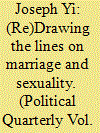

|
|
|
|
|
| Publication |
2013.
|
| Summary/Abstract |
The campaign for same-sex marriage is animated by two, contradictory impulses: a libertarian-egalitarian strain that continually expands the boundaries of what is publicly legitimate; and a conservative one that seeks to reinforce traditional boundaries. Democratic polities would benefit from public discussion on whether to retain normative, sexual boundaries, and if so, what they should reasonably be. I outline a moderately conservative agenda that would limit public legitimacy to sexually exclusive monogamy (heterosexual or homosexual), but informally tolerate most, consenting, nonconventional sexual practices. A spirit of humility, empathy and tragedy will help us to exercise reasonable judgement as we redraw the lines on marriage and sexuality.
|
|
|
|
|
|
|
|
|
|
|
|
|
|
|
|
| 2 |
ID:
188976
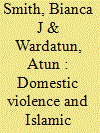

|
|
|
|
|
| Summary/Abstract |
This article argues that the Sufi practice of dhikr in combination with Quranic recitation and prayer can be understood as “hidden agency” Muslim women exercise in their mediation of violence and piety, particularly so in attempts at lessening their suffering of domestic violence. Our arguments indicate that women actively work towards employing a spiritual approach to their suffering that can be described as Sufi and that they exercise agency in an Islamic way that is bound by their connection with Allah. Our use of the term agency is therefore a nuanced one that is multidimensional and flexible in that it can expand and contract in different circumstances and is at the same time concerned with one’s embeddedness in Allah’s Divinity. This understanding of agency contrasts with normative sociological and feminist ones that see agency as a human’s capacity to act in response to social structures and power relations without necessarily allocating a dimension for an understanding rooted in Divinity. Based on anthropological fieldwork from 2017 to 2020 in Lombok, West Nusa Tenggara, Indonesia, we explore Muslim women in abusive marriages by engaging the notion of a pluralized agency that women exercise in an Islamic framework. The article further considers ethical tensions feminists face when working with women victims who do not live from a human rights understanding of domestic violence and instead focus on enhancing piety in response to suffering.
|
|
|
|
|
|
|
|
|
|
|
|
|
|
|
|
| 3 |
ID:
173335
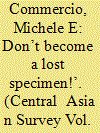

|
|
|
|
|
| Summary/Abstract |
Why would a woman agree to wed a legally married man when the state would neither recognize her marriage nor grant her alimony, child support or inheritance rights? Although the Communist Party curtailed the rate of openly acknowledged polygynous marriages among the Kyrgyz, its work was undone by glasnost and perestroika, which ushered in a permissive environment. This article highlights constructions of gender as a driver of polygyny in Kyrgyzstan from the perspective of women who voluntarily become second wives. The Kyrgyz case suggests that the cultural value of marriage and motherhood – traditions that grant women communal identities, power and prestige – might lead a woman to consent to second-wife status. I employ the concept of motivational interconnectivity, defined as two or more related reasons women make important personal decisions that have societal repercussions, to explain a woman’s decision to become a second wife.
|
|
|
|
|
|
|
|
|
|
|
|
|
|
|
|
| 4 |
ID:
094174
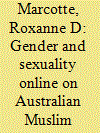

|
|
|
| 5 |
ID:
029569
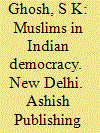

|
|
|
|
|
| Publication |
New Delhi, Ashish Publishing House, 1984.
|
| Description |
xvi, 192p.
|
|
|
|
|
|
|
|
|
|
|
|
Copies: C:1/I:0,R:0,Q:0
Circulation
| Accession# | Call# | Current Location | Status | Policy | Location |
| 022131 | 305.697095404/GHO 022131 | Main | On Shelf | General | |
|
|
|
|
| 6 |
ID:
091664
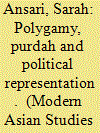

|
|
|
|
|
| Publication |
2009.
|
| Summary/Abstract |
Debates on Islam, citizenship and women's rights have been closely interconnected in Pakistan, from the time of the state's creation in 1947 through to the present day. This article explores the extent to which during the 1950s campaigns to reform Muslim personal law (which received a boost thanks to the outcry against 1955 polygamous marriage of the then Prime Minister, Muhammad Ali Bogra) were linked with wider lobbying by female activists to secure for women their rights as Pakistani citizens alongside men. Through a close examination of the discussions that were conducted on the pages of English-language newspapers, such as Dawn and the Pakistan Times, it highlights in particular what female contributors thought about issues that were affecting the lives of women in Pakistan during its early, and often challenging, nation-building years.
|
|
|
|
|
|
|
|
|
|
|
|
|
|
|
|
| 7 |
ID:
159872
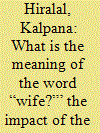

|
|
|
|
|
| Summary/Abstract |
This paper maps out the shifting and restrictive nature of immigration laws on the wives of resident Indians moving to South Africa. The turn of the century witnessed a gradual entry of women seeking to join their spouses in South Africa. However, on arrival some discovered that they were ‘prohibited’ immigrants, as Indian customary marriages came under intense scrutiny from immigration officials, Appeal Boards and courts. This paper argues that immigration and judicial officials, at times, became a law unto themselves by becoming official gatekeepers determining who was really a ‘wife’ and who could therefore enter the country. It shows how immigration officials, through a system of documentation and verification procedures, carefully scrutinised and monitored the entry of resident Indian wives into the Union. Thus, ‘what is the meaning of the word “wife”’ became a highly contested and complex issue at the turn of the century. The shifting and restrictive nature of immigration laws limited citizenship rights to resident Indian wives. This article adds to current debates on gender and citizenship in historical migrations amongst non-indentured, free Indian women immigrants to South Africa – a topic that is yet to be fully explored.
|
|
|
|
|
|
|
|
|
|
|
|
|
|
|
|
|
|
|
|
|